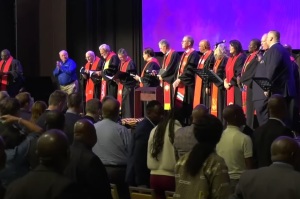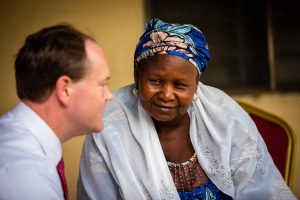Is the Pro-Life Cause Winning?
TIME magazine's recent cover story announces that, forty years after Roe, the pro-life side is winning the abortion debate. I say, "Not so fast."
On the one hand, yes, as the article points out, there have been some real gains in protections for the unborn in some important arenas. And public polling data does demonstrate, rather consistently, that younger people are more willing to identify themselves as being "pro-life" than are their mothers' generation. This is due partly to sonogram and other technologies that make it harder and harder to maintain that the "fetus" is a clump of impersonal tissue. Whenever evangelical Christians see polls like this, we tend to see some triumphalist rhetoric about how "we're winning."
I think it's more complicated than that.
Yes, it's a win just that the concept of "pro-life" is still alive. The abortion rights movement probably assumed that forty years after the Supreme Court legalized abortion that the issue would be as settled as school integration or women's suffrage. It's still a controversy, and the pro-life side hasn't been sidelined by history.
And it's true that there have been some gains in the numbers of doctors who, for conscience reasons, are unwilling to go along with the lie that abortion is "health-care."
That said, we must remember that the large numbers of self-identified pro-life people might itself in some instances be an indicator of just how embedded the abortion rights culture is in American life.
Here's why.
It's easy to identify as "pro-life" when one sees nothing really at stake. For forty years, legal abortion has been securely anchored in American law. Even after the rise of the Religious Right, two Reagan Administrations and three Bush Administrations, abortion is legal everywhere in the United States. With this the case, it is easy for Americans to see the debate as a matter of theory rather than a matter of policy.
I remember having a discussion once with friends about what side I would have taken on the Vietnam war had I been alive in the 1960s. That's an easy coffee shop discussion to have because I don't have a draft notice in the mail. I'm not on a campus being mentored by an anti-war professor. I'm not a Cambodian farmer or a south Vietnamese shrimper in danger of being murdered by the Khmer Rouge or the Vietcong.
There are all sorts of politicians who have identified as "pro-life" when all that meant was casting relatively symbolic votes. Former Louisiana Gov. Buddy Roemer and former Idaho Gov. Cecil Andrus, for example, were reliably pro-life, until they were presented with legislation restricting abortion in meaningful ways in their states. At that point, they shifted.
I'm afraid the same is true on the individual level. A feminist leader once said that most Americans are pro-life with three exceptions: rape, incest, and "my situation." When the teenage daughter is pregnant, the theory is abandoned and bloodthirsty pragmatism rules. I fear this feminist is all too right.
Pharaoh was pro-immigrant until the Israelites threatened what he wanted. The first Herod Administration was pro-Messiah until the actual Messiah threatened his throne. The second Herod Administration was fine with desert prophets until one meddled with his "adult entertainment." Lots of people are pro-life and pro-child until the lives of children become personally inconvenient.
Does that mean that I, as a pro-lifer, am pessimistic about the future of our engagement on this issue. Not at all.
I just think that we must have a realistic view about how ingrained the abortion-rights worldview is in our culture. We are on the lookout for the ways in which the death culture seeks to circumvent the state of the debate through pernicious new technologies and through the more subtle changes in culture that make children seem to be burden rather than blessing. Knowing the persistence of the abortion culture shows us what we're up against, but it doesn't sap our spirit.
The cause of the unborn will triumph, ultimately, because Jesus is alive and justice will win. Until then, polls go up and polls go down. We advocate for life, whether "winning" or not, because life isn't a government grant or an act of charity granted by the "choice" of another human being.
And we struggle for the protections we can gain for our unborn neighbors as we seek to cultivate a long-term vision of the dignity of all human life in our churches and communities.
To paraphrase the radical curmudgeon Edward Abbey, I am an optimist in the long-run, and by "long-run" I mean the next 5,000 years.
Until then, we work, we plead, we stand, whether we look like winners or not.





























